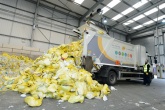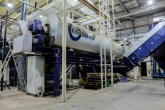New bill aims to make single-use nappies history

The Nappy (Environmental Standards) Bill was launched yesterday (27 March) by SNP MP for Glasgow East, David Linden. It sets out plans to establish an industry and government-led campaign to encourage parents to take up reusable cloth nappies.
Single-use nappies are costly and difficult to recycle, as they are made up of a mixture of materials: a plastic outer layer combined with inner layers of a non-woven polymer textile, fluff pulp and sodium polyacrylate or superabsorbent polymer (SAP), small crystals that can soak up huge amounts of liquid.
This complexity means most local authorities can’t collect nappies for recycling, as the UK lacks adequate processing facilities and secondary markets for the recovered materials.
NappiCycle recycles nappies and other absorbent hygiene products (AHP) for some Welsh councils – with a higher recycling rate than other UK nations and higher targets to meet, Wales puts more focus on recycling complex waste streams. However, one of England’s only nappy recycling plants, operated by US firm Knowaste, closed down in 2013, leaving its local authority clients at a loss, and the company failed to gain planning permission for a new facility.
Moreover, continued funding cuts mean many English local authorities struggle to provide more basic waste and recycling services. In this environment, setting up a nappy recycling scheme is often not financially viable.
Are reusable nappies the solution?
Reusable nappies have long been touted as a solution to the problem. The Nappy (Environmental Standards) Bill hopes to encourage greater usage of the reusable items by providing for better education on the impacts of different types of nappies. Life cycle studies by the Environment Agency, for instance, show that reusables have a less damaging effect on the environment than disposables – as long as they are reused for as long as possible, washed in full loads at 60 degrees or lower and air dried rather than tumble dried.

To make reusables more appealing to consumers, the bill will also incentivise councils to provide reusable nappy voucher schemes, such as the Real Nappies for London scheme, which supports parents with the upfront cost of making the switch. In addition, the bill will also seek to prevent ‘biodegradable’ nappy manufacturers from using ‘false eco-friendly claims’ on their products.
The bill is being supported by The Nappy Alliance, an organisation set up by reusable nappy providers to promote their products. Guy Schanschieff, chair of The Nappy Alliance, said: “Reusable nappies have increased in popularity in recent years but there is much more that can be done to support and entice new parents, by giving them more product information and ensuring that they are not be misled by so-called ’eco’ disposable nappies which are not environmentally friendly.”
The government has previously indicated that it would be supportive of measures to reduce the number of disposable nappies being thrown away. Discussing plans to crack down on cotton buds and plastic straws in October 2018, Environment Secretary Michael Gove was asked about disposable nappies and said: “We are going to have to identify, not quite item by item, but sector by sector, those areas where we do need to take a different approach.”
The comment was interpreted initially as signalling a potential ban on the items. Gove later qualified his statement to say: “I’m keen to look at how we tackle waste better – but no nappy ban is on the agenda.”
In world news, the Pacific nation of Vanuatu, part of the Commonwealth Clean Oceans Alliance, has recently committed to banning single-use nappies entirely. The legislation comes as part of a wider plan to eliminate single-use plastic products, including drinks stirrers and polystyrene cups. If the legislation gets final approval it could be in place by the end of the year, meaning the country will quickly need to ensure it has enough affordable, reusable alternatives on offer.








